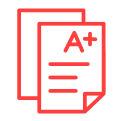
CFA Training Components for General Level
Training Modules
- Speaking | Reading | Writing | Listening
What is CFA?
A Premier Credential for Investment and Financial Analysis Professionals.
CFA stands for Chartered Financial Analyst, a globally recognized professional credential offered by the CFA Institute (USA). It is considered the gold standard qualification in investment and finance and is highly valued by employers in fields like:
- Portfolio Management
- Investment Banking
- Equity Research
- Wealth Management
- Risk Analysis
- Corporate Finance
The CFA Program is designed for individuals who want to build deep expertise in financial analysis, ethics, and investment management. It consists of three levels (Level I, II, and III), each testing your ability to apply core financial concepts in real-world scenarios.
.jpg)
CFA Program Structure
Three Levels Covering Investment Tools, Asset Valuation & Portfolio Management.
The CFA Program consists of three levels:
- Level I – Focuses on the basics of investment tools, ethics, and financial reporting
- Level II – Emphasizes application through asset valuation and complex analysis
- Level III – Concentrates on portfolio management and wealth planning
Each level requires deep analytical skills, conceptual clarity, and consistent practice. Exams are conducted in a computer-based format multiple times a year.
.png)
Is CFA Right for You?
Perfect for Those Aspiring to Excel in Finance and Investment Careers.
If you are:
- Passionate about investments and finance
- Interested in global roles in banking, asset management, or research
- Looking for a strong alternative to MBA in finance
- A working professional aiming to specialize and move upward
Then CFA is one of the best-value qualifications you can pursue.
Ready to earn your CFA designation and accelerate your finance career? Let Globewarts mentor you every step of the way—from study plans to job prep.

Master CFA Journey with Globewarts
Speaking
- Global recognition and career impact
- Three-level exam structure
- Commitment and rigor
- Real-world application with practical skills
Reading
- Ethical and Professional Standards
- Quantitative Methods
- Economics and Financial Reporting
- Portfolio Management and Wealth Planning
Writing
- Clear and concise explanations
- Application of financial concepts
- Structured responses
- Strong ethical reasoning
Listening
- Understanding key concepts
- Critical thinking and analysis
- Listening for ethical considerations
- Identifying key details in case studies
Features
Explore key features curated to enhance your preparation and performance.

Your CFA Journey: Build a World-Class Investment Career
Understand the CFA Program structure, level-wise roadmap, and what it takes to earn the gold standard in finance. Plan your study strategy and timeline from the very start.

CFA Level I: Building Investment Basics
Grasp foundational topics like Ethics, Quantitative Methods, and Financial Reporting. Learn how to approach MCQs with precision and manage time across 10 topics effectively.

CFA Level II: Mastering Financial Analysis
Deepen your understanding of asset valuation, equity research, and financial modeling. Learn how to tackle item set questions using real-world scenarios and analytical thinking.

CFA Level III: Becoming a Portfolio Strategist
Focus on portfolio management, wealth planning, and case-based writing. Discover strategies to write impactful constructed responses and manage time in a narrative format.

Why CFA? Global Credibility & Specialised Knowledge
Explore how CFA opens doors to top roles in investment banking, asset management, equity research, and consulting. Learn about its value across 160+ countries.

Eligibility & Timeline: When and How to Begin
Understand degree requirements, work experience expectations, and exam cycles. Learn how to plan your attempt windows and balance CFA prep with a job or master’s program.

Study Plan & Tips: Stay Consistent, Stay Ahead
Break down the 300-hour rule into weekly goals. Use CFA Institute resources, mock exams, and active recall strategies to improve long-term retention and exam readiness.

Work Experience & CFA Charter: Completing the Final Step
Learn how to document your 4,000 hours of relevant experience, find professional references, and apply for the charter. Understand timelines and submission tips.

After CFA: Career Pathways & Further Credentials
Explore roles like Portfolio Manager, Financial Analyst, Risk Consultant, or ESG Analyst. Discover how to combine CFA with certifications like FRM or an MBA for maximum impact.
Frequently Asked Questions
On average, it takes 2.5 to 4 years to complete all three CFA levels, depending on your preparation time, exam performance, and work commitments.
CFA and MBA serve different goals. CFA is more technical and investment-focused, while an MBA offers a broader business education. The choice depends on your career path.
Yes, you can register for the Level I CFA exam in your final year of undergraduate studies, but you’ll need to complete your degree before progressing to Level II.
You must have a bachelor’s degree (or be in the final year), possess a valid international passport, and meet the professional conduct requirements.
Yes, many candidates study while working full-time. It requires strong time management, as the program is rigorous and demands consistent effort.
Turn Your Dream University Into Reality.
Let's bring your 'Dream Career' to life together.







